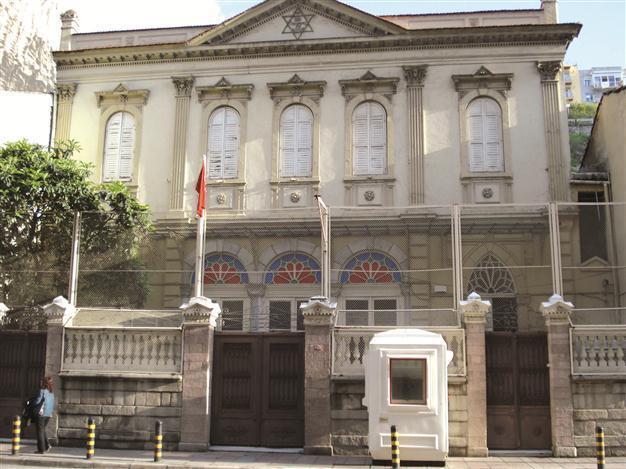Jewish community in İzmir gains legal status
İZMİR

İzmir’s Beth Israel Synagogue is among the properties to be returned to the foundation once the bureacuratic procedures are completed, the report said. Hürriyet photo
Turkey’s Foundations Council Dec. 13 recognized the country’s Jewish community in the Aegean province of İzmir as a legal entity, thereby resolving a century-old problem regarding ownership rights over the community’s properties and houses of worship.The ownership of some four shops and a dozen synagogues, including Shalom, Giveret, Elgazi, Bikurholim, Beth Israel and Rosharr on İzmir’s Havra Street, will be turned over to the newly recognized “İzmir Jewish Community Foundation,” once bureaucratic procedures are completed, daily Hürriyet reported.
“It bears great significance for real properties to be placed within a legal framework and officially registered in the name of the Jewish community,” Laki Vingas, the spokesperson for Anatolian Greek foundations and a council member in charge of minority foundations under the Foundations Directorate General, told the Hürriyet Daily News.
The decision was extremely appropriate, Vingas said, adding that the Jewish community in İzmir rested on a 300-year-long past.
“We meticulously dwelt upon the return of three foundations. One of these was the derelict Anatolian Greek High School in [Istanbul’s] Beyoğlu district, while another one was the Jewish Foundations that have now been handed back in İzmir,” Vingas said.
The Armenian Clerical School Tıbrevank Foundation in Istanbul’s Üsküdar district is next in line, he said.
The Armenian clerical school’s theology department was shut down in 1969 by the Turkish state, and the foundation was then taken over from the Armenian community. While the Sourp Haç Armenian High School continues to provide education under a special status inside the school’s historical building, trials pertaining to the clerical school are still underway.
“There is substantial history lying there. Even restoration work could not be performed. It was in terrible shape. Now our assets have been returned back to us,” Mari Loker-Gormezano, who ran for a seat in Parliament from the opposition Republican People’s Party (CHP) on behalf of Turkey’s Jewish community during the last elections.
The Turkish government enacted another measure that went into effect on Aug. 27 to return properties seized from minority foundations through a proclamation that was declared in 1936. The decision also required financial reparations to be paid to minority communities at market value for properties that had been sold to third parties.
Minority groups gave the government a proclamation in 1936 detailing their real properties. Over the years, however, these properties were not registered under the minority foundations’ names, and some were even sold to third parties, according to the Anatolia news agency.
In 2008, the government took steps toward remedying this problem, but the efforts fell short and pushed some foundations to take their cases to the European Court of Human Rights. The court ruled in favor of the minority communities and sentenced Turkey to pay large sums in compensation to the foundations.
















